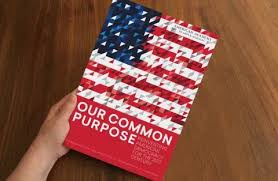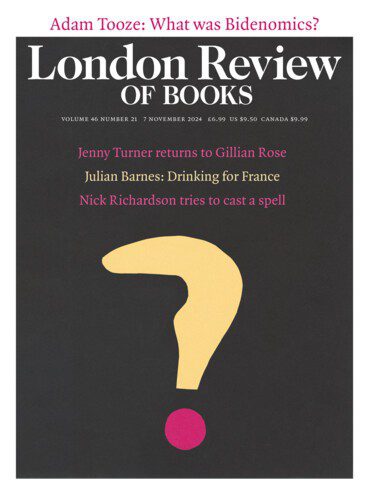by Sincerely, T…Martial law can dramatically alter daily life and limit personal freedoms. Remaining informed, prepared, and organized is essential. If resistance is necessary, prioritize peaceful and lawful methods to protect yourself and your community.
The militia and the mole
by Joshua Kaplan in Propublica…A Freelance Vigilante: A wilderness survival trainer spent years undercover, climbing the ranks of right-wing militias. He didn’t tell police or the FBI. He didn’t tell his family or friends.
An emerging third option: Reclaiming democracy from dark money & dark tech
by Otto Scharmer in Medium…In short — the key to the profound changes that our current polycrisis is calling for lies in the cultivation of the social soil. Every one of us can be (and is) a gardener or farmer of that soil. In our forthcoming book Presencing we outline the core practices for doing so.
Blueprint 2025; Gerry Salole in conversation with Lucy Bernholz
Youtube conversation between Gerry Salole and Lucy Bernholz…We are deeply moved to share insights from an extraordinary dialogue between Lucy Bernholz and Gerry Salole on the launch of Blueprint 2025. This conversation couldn’t be more timely as we face unprecedented challenges to democracy worldwide.
At some nonprofits, a delicate balance of grief and strategy
by Sara Herschander in The Chronicle of Philanthropy…After the election, many leaders are balancing emotional support for rattled staff with practical preparations for funding cuts and policy changes.
There are many ways Trump could trigger a global collapse. Here’s how to survive if that happens
by George Monbiot in The Guardian…It could be wildfires, a pandemic or a financial crisis. The super-rich will flee to their bunkers – the rest of us will have to fend for ourselves
More in this category

Our common purpose
from the American Academy of Arts & Sciences…Our Common Purpose: Reinventing American Democracy for the 21st Century, a report of the American Academy’s Commission on the Practice of
Democratic Citizenship, comes at a pivotal moment in the history of the
American experiment.
Left organizing is in crisis. Philanthropy is a major reason why.
by Nina Luo in The Nation…Progressive philanthropy lacks good strategy, so too many of our organizations are hollow—and that left us unable to prevent a second Trump term.

Great power politics Adam Tooze on Bidenomics
by Adam Tooze in London Review of Books…America’s more liberal-minded spokespeople may talk about America limiting itself to defending a small yard with a high fence. But what is inside that fence is clearly everything that matters to state power in the current moment.
FBI warns Americans to start using encrypted messaging apps
by Matt Novak in Gizmodo.com…It’s all about protecting against China, but there’s the added benefit of protecting against Trump.
Big tech’s class war politics
by John Ganz in Unpopularfront.news…I think we are in a crisis of hegemony moment: neoliberalism is dying, but its replacement is yet to be born. And, as in pre and post-hegemonic times, the field of politics is fragmented and incoherent, there’s no hegemonic class or portion of a class that’s able to lead, so everything reverts to “the economic-corporate phase,” when different social interests seek their own short-term benefits rather than coalescing behind a vision of social development.
‘Would you survive 72 hours?’ Germany and the Nordic countries prepare citizens for possible war
by Jon Henley, et al. in The Guardian…Apps and booklets are offering advice on how to build a bunker, stockpile food and live without electricity in case the worst happens
An emerging third option: Reclaiming democracy from dark money & dark tech
by Otto Scharmer in Medium…What does that tell us about democracy? Democracy is under strain globally, with mass misinformation eroding citizens’ ability to perceive and respond to the realities they face.
The disturbing power of information pollution
by Michael P. Lynch in MIT Press…When we’re lulled into giving up on truth, we give up on critical thought — even dissent itself.
Global trends are polarizing us: Can democracy handle it?
by Richard Heinberg in resilience.org….Today the world faces historically unique stresses that are likely to be increasingly polarizing for many societies. These stresses can be divided into three groups—environmental, economic, and technological. After examining these, we’ll explore two questions: first, is democracy inherently more polarizing than autocratic forms of government? And second, are democracies or autocracies better at handling crises?
Chartbook 307 To live or not to live with polycrisis: The USA, Mexico and the need for a regional policy in Central America and the Caribbean.
by Adam Tooze in Chartbook…What is needed is not more border controls and militarized policing, but a pooling of governmental resources amongst the stronger players in the region including USA, Mexico the richer Caribbean states and Colombia, not to oppose, but to facilitate, support and invest in the extraordinary human energy, grit and determination that is the counterpart to those remittance flows.
Disinformation poses an unprecedented threat in 2024 — and the U.S. is less ready than ever
by Brandy Zadrozny in NBC News…The U.S. presidential election comes at a time of ideal circumstances for disinformation and the people who spread it.
Arundhati Roy: The dismantling of democracy in India will affect the whole world
Millions live on subsistence rations delivered in packets with Modi’s face printed on them. India is a very rich country with very poor people. One of the most unequal societies in the world. For its pains, Oxfam India has been raided too. And Amnesty International...
Chartbook 218: “So far from god” … friend-shoring and the debate in Washington over whether to bomb Mexico.
by Adam Tooze in Chartbook….Proximity brings safety and harmony only if you have sorted out your neighborly relations. That is far from being the case between Mexico and the USA.
Beyond growth: speech by President Ursula von der Leyen
Ursula von der Leyen, President of the European Commission, delivered this speech during the opening plenary of the Beyond Growth conference
The second phase of the Biden presidency
By David Brooks, The New York Times…f you ask me now what the Biden administration is for, my answer would be different. Today, its main purpose is to prepare the nation for a period of accelerating and explosive change.

